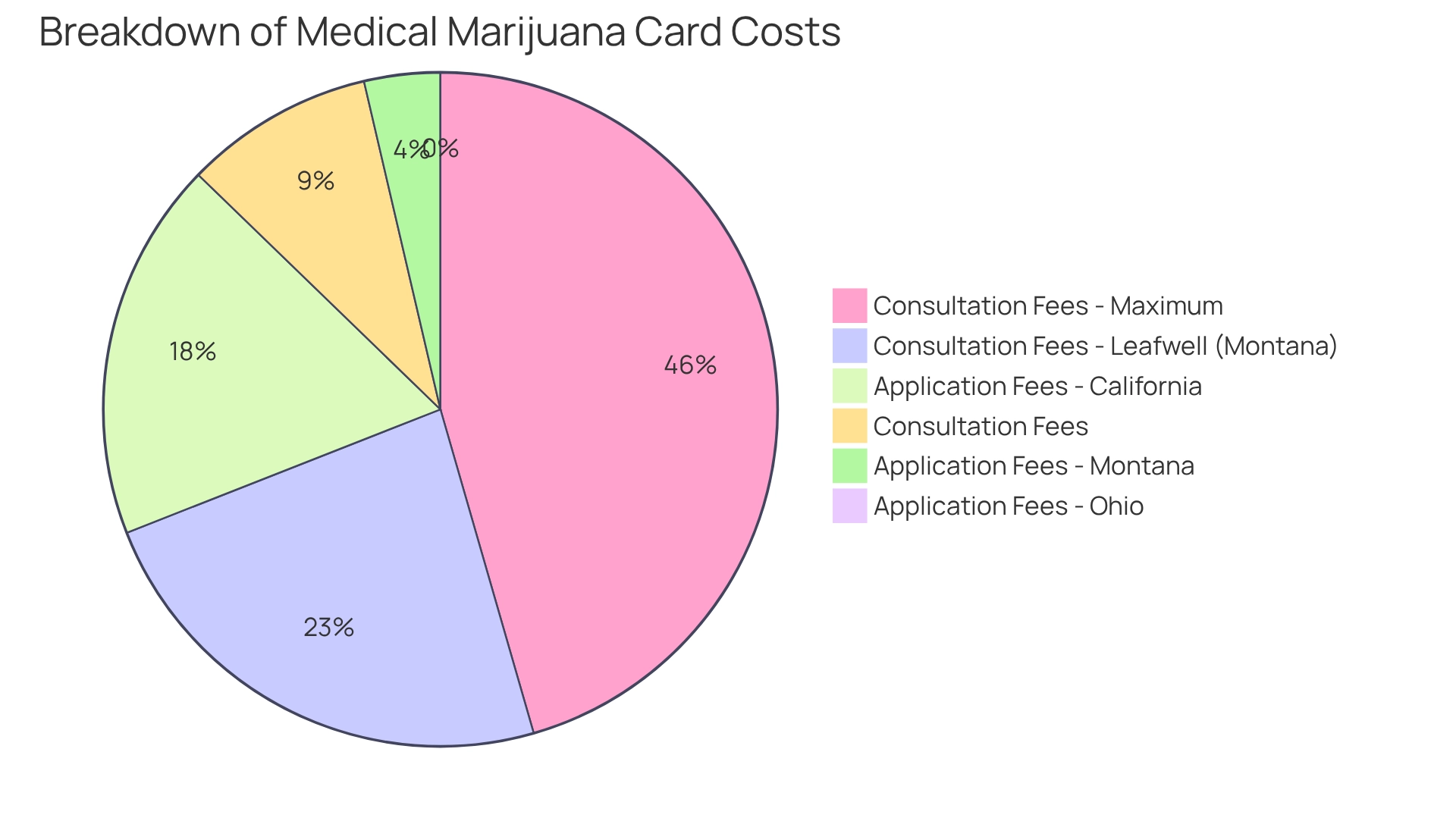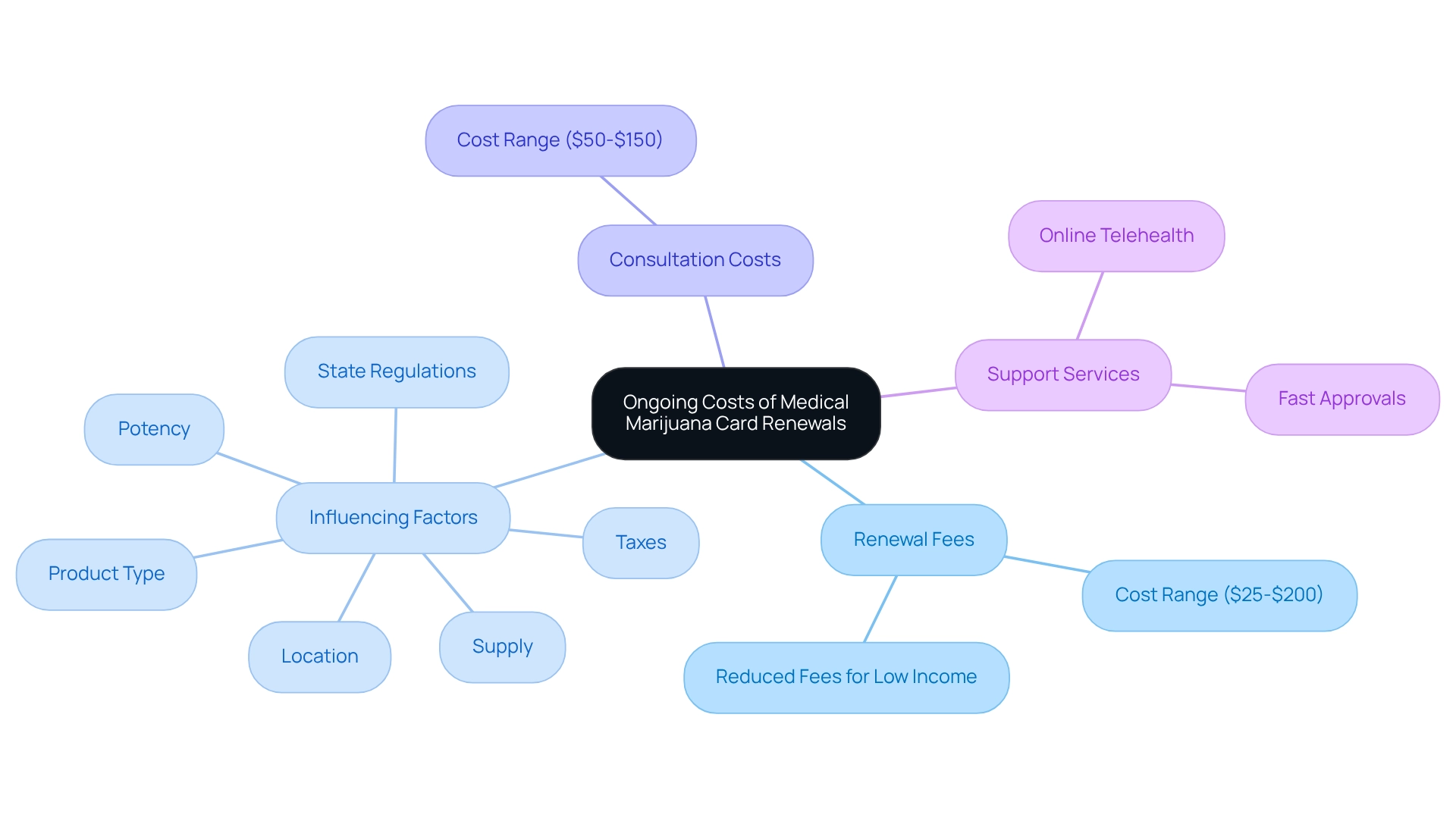What You Need to Know About Medical Marijuanas Card Costs: A Comprehensive Overview
by Maya Green · April 5, 2025
Discover the factors influencing medical marijuanas card costs and budget wisely for treatment.

Overview
Navigating the costs of obtaining a medical marijuana card can be a daunting experience for many patients. It’s important to remember that these costs can vary widely, influenced by regional regulations and individual circumstances. Typically, you may encounter consultation fees and application fees that range from $0 to $250 or even more. Understanding these potential expenses is crucial, as it empowers you to budget effectively.
Moreover, there are financial assistance programs available that can help ease this burden. By exploring these options, you can access the therapeutic benefits of cannabis without undue financial strain. Remember, you are not alone in this journey; many have faced similar challenges and found ways to overcome them. Take the time to research and reach out for support, as this can make a significant difference in your experience.
Introduction
Navigating the world of medical marijuana can feel overwhelming, especially when trying to understand the costs and processes involved in obtaining a medical marijuana card. These cards are essential for patients seeking relief from various medical conditions through cannabis, yet the journey to acquire one often presents financial considerations and regulatory hurdles. As more states legalize medical cannabis, the landscape is changing rapidly. It’s important for patients to grasp the nuances of application fees, consultation costs, and ongoing expenses. This article aims to explore the essential aspects of medical marijuana cards, providing insights into the financial implications and available resources that can support patients in their quest for relief.
Understanding Medical Marijuana Cards: An Overview
Medical cannabis cards are official documents provided by state authorities that allow individuals to legally acquire and use cannabis for therapeutic reasons. These cards are typically awarded to those diagnosed with specific health conditions, such as chronic pain, anxiety, PTSD, and epilepsy, among others. The process of obtaining a cannabis card usually involves a consultation with a certified healthcare professional who assesses the individual’s condition to determine if cannabis is a suitable treatment option.
It’s important to recognize the significance of therapeutic cannabis cards, particularly for individuals suffering from chronic pain who often seek alternative therapies when conventional treatments fall short. In recent years, there has been a notable increase in the issuance of these cards across the United States, reflecting a growing acceptance of cannabis as a legitimate therapeutic treatment. For context, in 2015, 58 percent of Americans supported the legalization of cannabis, indicating a shift in public perception.
As of 2025, statistics suggest that around 3 million Americans possess therapeutic cannabis cards, with many reporting improvements in their conditions. Studies show that individuals with medical marijuana cards enjoy better access to cannabis products, which can lead to more effective symptom management. For example, a case study involving Leafy DOC illustrates how the platform has simplified the application process, enabling individuals to receive evaluations and certifications without the need for traditional in-person visits. This approach not only enhances access for those in rural areas or with mobility challenges but also emphasizes a person-centered model that prioritizes privacy and efficiency.
Leafy Doc’s commitment to swift approvals and comprehensive support further distinguishes it from competitors, ensuring that individuals can quickly obtain the care they need. Healthcare professionals recognize the benefits of cannabis cards, noting that they provide patients with legal protection and access to various therapeutic options. While research into cannabis’s therapeutic effects continues to evolve, anecdotal evidence supporting its use for conditions like chronic pain, anxiety, and epilepsy is compelling. As Gerald J. McKenna, MD, stated, “Until that research is completed, claiming that cannabis is beneficial for managing chronic pain, anxiety, post-traumatic stress disorder, depression, and other health issues remains anecdotal and speculative.”
Ongoing research into the therapeutic benefits of cannabis is essential for validating its effectiveness and expanding its acceptance within the healthcare community. Overall, understanding the eligibility requirements and application process for medical marijuana cards is crucial for individuals navigating the complexities of accessing medical cannabis. Success stories from individuals further illustrate the positive impact these cards can have on quality of life, reinforcing the importance of this resource for those seeking relief from chronic pain. Leafy Doc’s telehealth services provide an effortless connection to licensed cannabis doctors, making the certification process more accessible and efficient for patients.
Breaking Down the Costs of Medical Marijuana Cards
The cost of obtaining a medical marijuana card can vary significantly based on regional regulations and individual circumstances. Patients typically face two primary expenses: the consultation fee with a healthcare provider and the application fees associated with the card. Consultation fees can range from $50 to $250, influenced by the provider’s expertise and location.
For instance, in Montana, Leafwell charges $129 for an appointment, while pricing may differ in other regions.
In addition to consultation fees, the overall cost of the medical marijuana card, including application fees, can vary widely, ranging from $0 to $200. For example, California’s application fee can be as high as $100, whereas Ohio offers an impressively low fee of just one cent. In Montana, the state application fee is $20.
This variation highlights the importance of understanding the financial landscape surrounding the medical marijuana card cost, especially when budgeting for your cannabis needs.
To ease the process, Leafy DOC provides convenient online telehealth services, allowing individuals to obtain their medical marijuana cards efficiently. After receiving certification from a qualified doctor, individuals may need to register with their state, often online. Depending on the region, approval may lead to a downloadable patient ID card, which can be printed or sent to facilitate access to local dispensaries for medicinal cannabis products.
A closer look at cannabis expenses reveals that the average cost for one ounce of premium quality product is about $326 nationwide. However, this price varies by state, with Oregon averaging $211 and Washington D.C. reaching as high as $598. Such fluctuations can impact how much cannabis users should consider acquiring to balance the costs of obtaining their health cannabis cards.
Real-life examples illustrate how individuals allocate their budgets for these expenses. Many find that the financial benefits of obtaining a cannabis card can outweigh the initial medical marijuana card cost after just a few visits to dispensaries. As noted by NuggMD, “Unlike in-person evaluations, you only pay for your evaluation if you’re approved,” highlighting the cost-effectiveness of online evaluations through services like Leafy DOC.
By understanding the state-by-state breakdown of medical marijuana card costs and utilizing online resources, individuals can make informed decisions that align with their healthcare needs and financial situations.
As the landscape of therapeutic cannabis continues to evolve, staying informed about average costs and consultation fees is essential for patients navigating the complexities of obtaining their therapeutic cannabis cards effectively.
Factors Influencing Medical Marijuana Card Costs
Understanding the cost of a medical marijuana card can be overwhelming, especially when considering the various factors at play, such as your region of residence. Each area has its own fee structure and regulatory system governing cannabis for health purposes. For instance, in states like California and Colorado, the medical marijuana card cost tends to be more affordable compared to places like New York, where stringent regulations can drive prices up significantly.
It’s important to note that, according to the Pew Research Center, 74% of Americans live in regions where cannabis is allowed for either recreational or therapeutic use. This statistic highlights the growing accessibility of therapeutic marijuana, which can be a source of relief for many.
To begin your journey toward obtaining a therapeutic marijuana card, you typically start by consulting a licensed healthcare professional. The choice of provider can influence the cost of your medical marijuana card, as some may charge higher fees for their expertise in medical cannabis evaluations. It’s wise to evaluate your options to find a provider who balances cost with quality care.
Once you receive certification from your doctor, the next step often involves registering with your local authority, which may incur additional fees, including those associated with the medical marijuana card itself. After your registration is approved, you will usually receive a downloadable identification card that you can print or have mailed to you. This card is essential for accessing local dispensaries and purchasing medicinal cannabis products.
Many regions offer financial aid programs designed to help individuals manage these costs, including the medical marijuana card fees. These programs can significantly reduce the financial burden associated with obtaining a marijuana card. For example, some states implement sliding scale fees based on income, while others provide grants or subsidies specifically for low-income individuals.
Statistics indicate that more people are utilizing these programs, reflecting a broader trend toward improving access to cannabis for health needs. Additionally, the specific health condition being treated can also impact costs. Some conditions may require more extensive evaluations, leading to higher medical marijuana card expenses.
For instance, individuals facing complex health issues may need multiple consultations or additional paperwork, which can increase overall costs. State regulations play a crucial role in determining the medical marijuana card fees associated with therapeutic cannabis. As we look ahead to 2025, many states are expected to revise their fee structures in response to changing cannabis laws and market conditions.
Take Illinois, for example, where cannabis was legalized for adult use in 2019. The state has seen an impressive increase in tax revenue from cannabis sales, generating $105.9 million in the first nine months of legal sales alone. This financial success has sparked discussions about how these funds could be reinvested into support programs for individuals, potentially affecting the medical marijuana card costs for those in need of assistance.
Navigating the financial landscape of medical marijuana card costs can be challenging, but understanding these factors is key. By staying informed about potential expenses and available assistance, you can better plan your budget and ensure you receive the necessary care without undue financial strain. Moreover, with projections suggesting an increase in individuals using cannabis for therapeutic purposes across U.S. regions by 2027, it’s vital to remain updated on the evolving landscape of cannabis accessibility.
Leafy DOC is committed to enhancing access to cannabis through its online platform, offering telehealth services and educational resources to support individuals throughout the certification process.
Application Fees and Associated Costs
The cost of a medical marijuana card can vary significantly depending on the region, largely due to differing application fees, which can impact the total expense for individuals. For example, in Illinois, the application fee is around $75, while in Florida, it can reach up to $189, which includes both the initial consultation and registration. Conversely, some states like New York have eliminated application fees entirely, enhancing accessibility for patients seeking medical cannabis.
Step 1: Obtain a Certification
To begin your journey towards obtaining a medical marijuana card, the first step is securing a certification from a licensed physician. Leafy DOC provides a convenient online platform that connects you with licensed physicians who can assist in this process.
Step 2: Understand State Requirements
Once you have your certification, it’s essential to understand that requirements may differ by state. Some states require patients to register with the state after receiving their certification, while others do not. After your state approves your registration, you will typically receive a downloadable identification card via email, which you can print or receive by mail. This card empowers you to visit local dispensaries and purchase medicinal cannabis products.
Step 3: Consider Hidden Costs
However, it’s crucial to be aware of potential hidden costs that may arise during the application process. These could include fees for acquiring health records, additional consultations, or expenses related to follow-up appointments. Such costs can add up quickly, making it vital for you to have a comprehensive understanding of the overall medical marijuana card cost involved in obtaining a cannabis card.
A closer look at the costs across different states reveals that while some states may have lower application fees, others might impose additional expenses that can influence the total cost. For instance, the District of Columbia has the highest average expense for one ounce of high-quality cannabis at $598, highlighting the financial advantages of acquiring a therapeutic cannabis card. Patients often experience reduced taxes and fees compared to recreational users, resulting in significant savings after just a few visits to dispensaries.
Healthcare professionals emphasize the importance of being aware of these hidden costs, as they can significantly affect the overall medical marijuana card cost. It’s essential to determine how much cannabis you will need to purchase to justify the expense of obtaining a health-related cannabis card. Real-life stories illustrate how individuals have encountered unexpected fees, underscoring the necessity for thorough research and preparation before starting the application process.
By understanding both the visible and hidden expenses associated with the medical marijuana card cost, you can make informed decisions that align with your financial situation.
Consultation Costs with Healthcare Providers
Navigating the costs associated with obtaining a medical marijuana card can be challenging, and it’s important to recognize that consultation fees with healthcare providers can vary significantly. Factors like geographic location and the provider’s experience level play a crucial role in determining these costs. On average, you might expect the initial consultation for a medical marijuana card to range between $100 and $250. This variation reflects the diverse pricing structures across different states and practices.
Many compassionate healthcare professionals understand the financial hurdles that some individuals face. They often provide discounts for low-income patients or those enrolled in government aid programs. For instance, certain clinics may offer reduced rates or sliding scale fees based on income, making access to cannabis more equitable. If you’re considering scheduling an appointment, it’s wise to ask about these options.
It’s essential to clarify the total cost upfront, including any additional charges for follow-up consultations or necessary paperwork. This proactive approach not only helps in budgeting but also promotes transparency in your healthcare journey. As we look ahead to 2025, the average consultation fees for therapeutic cannabis assessments will continue to be an important consideration for many individuals.
Experts suggest that as the market evolves, pricing transparency will become even more crucial. Healthcare providers are increasingly emphasizing the importance of clear communication about costs, particularly regarding the medical marijuana card.
In Pennsylvania, it’s vital to be aware of the qualifying health conditions for therapeutic cannabis, which include:
- Chronic pain
- PTSD
- Others
Understanding these criteria can help you when seeking evaluations. Additionally, the renewal process for medical cannabis certifications typically occurs every one to three years, depending on state regulations.
Leafy DOC is dedicated to improving the quality of life for individuals by simplifying the process of obtaining a cannabis card through streamlined online telehealth services. With many applications processed within 24-48 hours, the platform provides expert guidance throughout the application journey, easing concerns about costs and consultations. As Trishita Deb, a market research and consulting expert, insightfully notes, “Pricing transparency is crucial for individuals to make informed choices regarding their healthcare options.”
By familiarizing yourself with these financial aspects and the legal framework surrounding medical cannabis, you can ensure that you receive the necessary evaluations without facing unexpected financial burdens. Remember, you’re not alone in this journey, and there are resources available to support you.
Ongoing Costs: Renewals and Additional Fees
Renewing your medical marijuana card is an important aspect of ensuring continued access to the care you need. Typically, these cards require renewal every one to two years, depending on local regulations. In 2025, renewal costs can vary significantly, ranging from $25 to $200 in different regions. Some areas, like California and Oregon, even offer reduced fees for individuals with low income, promoting greater equity in access to medical cannabis.
Several factors influence the cost of renewing your medical marijuana card, including state regulations, taxes, location, supply, product type, and potency. Alongside renewal fees, it’s essential to consider the costs associated with ongoing consultations with healthcare professionals. These consultations are often necessary for renewals or adjustments to your treatment plan, and fees can vary widely, typically ranging from $50 to $150 per visit, depending on your provider and location.
Understanding the costs involved in maintaining your medical marijuana card is crucial for ensuring your ongoing access to cannabis. A recent study published in Clinical Therapeutics found that 91% of military veterans who sought medical cannabis reported improvements in their quality of life. This highlights the importance of staying informed about renewal processes and costs, empowering you to make informed decisions regarding your healthcare and financial planning.
At Leafy DOC, we prioritize your needs by offering fast approvals and comprehensive support through streamlined online telehealth services. This makes it easier for you to navigate the renewal process and access the care you need, especially if you are managing chronic conditions. Remember, you are not alone in this journey, and we are here to support you every step of the way.
Financial Assistance and Resources for Patients
Many states have established financial assistance programs designed to alleviate the financial burden associated with obtaining and renewing medical marijuana cards. These initiatives often offer reduced fees specifically aimed at low-income individuals or those receiving government support, fostering greater equity in cannabis access. Additionally, non-profit organizations and advocacy groups play a vital role in helping individuals navigate the financial challenges related to cannabis access, providing essential resources.
For instance, numerous non-profits focus on connecting individuals with financial aid options, ensuring that those in need can find the necessary support to manage their healthcare expenses effectively. As we approach 2025, the importance of these financial assistance programs has never been more pronounced, given the increasing demand for cannabis. Statistics indicate that a significant number of low-income individuals are actively seeking financial assistance to cover the costs of medical marijuana cards, underscoring the necessity for accessible resources.
Trishita Deb, a Market Research and Consulting Analyst, highlights that understanding the financial landscape is crucial for patients facing these challenges. The average cost per ounce of cannabis in Colorado stands at USD 241.58, illustrating the financial strain that patients may experience. Moreover, the legalization of marijuana has generated substantial tax revenue for various regions, with areas permitting personal cannabis use amassing $4 billion in tax income in 2023. This revenue supports public health initiatives, infrastructure projects, and educational programs, showcasing the broader economic implications of cannabis legalization.
For example, Illinois reported over $490 million in cannabis-related tax revenue in 2024, contributing significantly to state funds.
Case studies reveal that organizations focused on social equity within the cannabis industry are increasingly addressing the financial barriers faced by marginalized communities. These efforts not only promote diversity and inclusion but also ensure that individuals from all backgrounds can access the care they need. Advocacy groups emphasize the importance of these resources, asserting that financial support programs are essential for managing the costs of medical marijuana cards, particularly for those who may struggle to afford them otherwise.
As patients explore their options, it’s advisable to investigate local organizations and programs that can provide assistance. By utilizing these resources, individuals can better navigate the financial landscape of cannabis, ensuring they receive the necessary support to enhance their quality of life. Furthermore, with the recent news of Trulieve launching a new dispensary in Pennsylvania, the expanding infrastructure supporting cannabis may also relate to the availability of financial assistance programs.
Additionally, the downward trend in registered therapeutic cannabis clients in Canada from 2020 to 2023 highlights the evolving landscape of access to therapeutic cannabis and the critical role of financial support.
Legal Considerations Impacting Medical Marijuana Card Costs
Legal factors significantly impact the cost of medical marijuana cards, as each region has its own rules regarding the application procedure, associated fees, and eligibility standards. It’s essential to recognize that certain states may impose higher application charges or require additional paperwork, leading to unexpected costs for individuals. For patients, especially those dealing with chronic issues like chronic pain, anxiety, or PTSD, understanding qualifying conditions—such as AIDS, cancer, multiple sclerosis, arthritis, epilepsy, and migraine—is crucial, as these can directly influence their eligibility for a cannabis card.
Staying informed about these regulations is vital to avoid complications during the application process. Recent legislative changes have added complexity to the landscape of cannabis access and fees. As regions continue to relax their cannabis regulations, the cost of a medical marijuana card can fluctuate. By 2025, several states have enacted regulations that either lower or raise application fees, which can directly affect individuals’ access to cannabis.
Comprehending these changes is essential for those looking to navigate the evolving legal framework. Many requests for therapeutic cannabis permits are processed within 24-48 hours, highlighting the efficiency of the application procedure amid these legal factors. Consulting with legal experts or advocacy groups can provide invaluable insights into these complexities. Legal professionals can assist patients in understanding how local laws impact application procedures and charges, ensuring they are well-prepared for any financial implications.
As David Ogden, Deputy Attorney General, pointed out, “we should not concentrate federal resources on individuals who are in clear and unambiguous compliance with current local laws permitting the medical use of marijuana.” This statement underscores the importance of adhering to state laws. Furthermore, the case study on Leafy DOC illustrates how the platform simplifies the application process and addresses legal complexities, enhancing user understanding of practical implications. It’s essential for individuals to know their rights and the legal framework surrounding cannabis to make informed choices. Additionally, some regions accept out-of-region health cards, while others do not, which is a significant consideration for those traveling or relocating.
Please keep in mind that the information provided is for educational purposes only and should not be considered legal advice. Readers are encouraged to consult legal counsel for determinations of their legal rights.
In summary, the interaction between state regulations and the cost of medical marijuana cards highlights the importance of being proactive in understanding legal aspects. By staying informed and seeking expert guidance, patients can navigate the intricacies of obtaining their medical marijuana cards with greater confidence.
Conclusion
Navigating the world of medical marijuana cards can feel overwhelming, especially when it comes to understanding the various financial aspects involved. The journey often begins with a consultation, which can range from $50 to $250, depending on the provider’s experience and where you live. It’s important to remember that state application fees can also vary widely, from as low as one cent to over $200, adding to the complexity of the financial landscape for potential patients.
As you consider these costs, ongoing expenses related to renewals and additional consultations may accumulate over time. Many states recognize the challenges faced by low-income patients and offer financial assistance programs to help ease this burden, making access to medical cannabis more equitable. This growing support reflects a broader understanding of the therapeutic benefits of cannabis for conditions like chronic pain and anxiety.
As the landscape of medical marijuana continues to evolve, staying informed about costs, legal considerations, and available resources is essential for anyone seeking relief. By understanding the nuances of application fees, consultation costs, and ongoing expenses, you can make informed decisions that align with your healthcare needs and financial situation. Remember, while the journey to obtaining a medical marijuana card may be complex, it is a crucial step toward accessing potentially life-changing treatment options. You are not alone in this process, and there are resources available to support you every step of the way.
Frequently Asked Questions
What is a medical cannabis card?
A medical cannabis card is an official document provided by state authorities that allows individuals to legally acquire and use cannabis for therapeutic reasons. It is typically awarded to those diagnosed with specific health conditions.
What health conditions qualify for a medical cannabis card?
Conditions that may qualify for a medical cannabis card include chronic pain, anxiety, PTSD, epilepsy, and others as determined by a healthcare professional.
How does one obtain a medical cannabis card?
To obtain a medical cannabis card, individuals usually need to consult with a certified healthcare professional who assesses their condition to determine if cannabis is a suitable treatment option.
Why are medical cannabis cards significant for patients?
Medical cannabis cards are significant as they provide legal protection and access to various therapeutic options, particularly for individuals suffering from chronic pain who seek alternative therapies when conventional treatments are ineffective.
How has public perception of medical cannabis changed in recent years?
There has been a notable increase in the issuance of medical cannabis cards across the United States, reflecting a growing acceptance of cannabis as a legitimate therapeutic treatment. For example, in 2015, 58 percent of Americans supported cannabis legalization.
How many Americans have medical cannabis cards as of 2025?
As of 2025, approximately 3 million Americans possess medical cannabis cards, with many reporting improvements in their conditions.
What advantages do individuals with medical cannabis cards have?
Individuals with medical cannabis cards enjoy better access to cannabis products, which can lead to more effective symptom management.
How does Leafy DOC facilitate the application process for medical cannabis cards?
Leafy DOC simplifies the application process by enabling individuals to receive evaluations and certifications without traditional in-person visits, enhancing access for those in rural areas or with mobility challenges.
What are the costs associated with obtaining a medical cannabis card?
The costs can vary widely and typically include consultation fees with healthcare providers (ranging from $50 to $250) and application fees (ranging from $0 to $200).
Can you provide examples of application fees in different states?
In California, the application fee can be as high as $100, while Ohio offers a fee of just one cent. In Montana, the state application fee is $20.
How do cannabis expenses impact individuals with medical cannabis cards?
The average cost for one ounce of premium cannabis is about $326 nationwide, but this varies by state. Understanding these costs helps individuals budget for their cannabis needs effectively.
What are the financial benefits of obtaining a medical cannabis card?
Many individuals find that the financial benefits of having a cannabis card can outweigh the initial costs after just a few visits to dispensaries, making it a cost-effective option for managing their health.
Last Updated: July 10, 2025
Get Approved for Your Medical Marijuana Card in Minutes!

Get Your Medical Card
Connect with a licensed physician online in minutes

Like This Article?
Share with your friends
Table of Contents
Keep Reading
-
How to Get a Medical Card in Montana
Looking to get a medical card in Montana? Here’s a step-by-step guide on how to do it.
-
Read Reviews Of Medical Marijuana Dispensaries In PA
Find the best medical marijuana dispensaries in PA through our honest reviews. Discover your perfect cannabis spot and start exploring today! Read PA Dispensary Reviews now!
-
Can Medical Cannabis Treat Nausea?
Discover if medical cannabis can be used to treat nausea and its associated symptoms. Learn about the potential benefits and risks of this popular alternative medicine.





